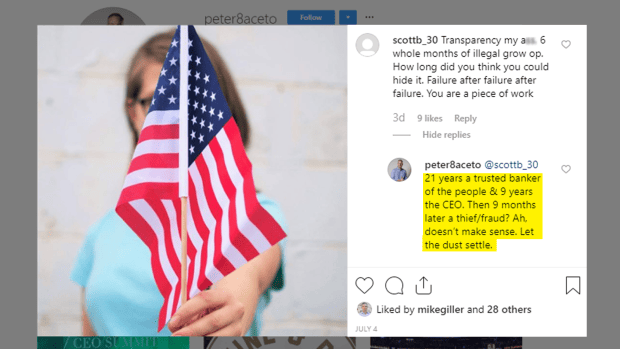The precedent has been set. When Ascent Industries (ASNT.C) lost its Canadian LP licensing over product that had allegedly found its way into the grey market, the regulators at Health Canada – rightly – didn’t hold back. They investigated publicly, loudly, and ultimately de-licensed the company, running the brains trust out of town on a rail.
Investors obviously hoped for leniency, so they could recover lost funds. I know, because I was one of them.
The executives responsible obviously hoped for a chance to redeem themselves and carry on the careers they’d worked years to create. The facility staff obviously hoped for a chance to keep their jobs, jobs that were well paid and seemed to have futures attached.
But Health Canada had a job to do, and to allow large corporations that have jumped through years of security hoops and spent sometimes hundreds of millions of dollars building out what is supposed to be a spotlessly clean operation – the cleanest damn operation possible, in any sector – to get away with growing weed without a license, and shipping that weed out to customers, and even exporting it to other countries, would be a complete fucking heresy.
And yet, CannTrust (TRST.C) got busted doing that, a situation that should be, frankly, unthinkable to anyone from the outside looking in. They grew weed in an unlicensed facility, and they packaged it, and they shipped it. They put it on planes to other countries.
Canntrust Holdings Inc. has received a compliance report from Health Canada notifying the company that its greenhouse facility in Pelham, Ont., is non-compliant with certain regulations. Canntrust has accepted Health Canada’s non-compliance finding and has taken actions to ensure current and future compliance.
Okay. Paperwork issue? Someone wasn’t washing their feet at the door? The janitor pocketed some kush after his break?
Nope.
The non-compliant rating is based on observations by the regulator regarding the growing of cannabis in five unlicensed rooms and inaccurate information provided to the regulator by Canntrust employees.
Oh cool, it was an employee screwup? Minor thing that was quickly fixed?
Nope.
Growing in unlicensed rooms took place from October, 2018, to March, 2019, during which time Canntrust had pending applications for these rooms with Health Canada.
Six months. This was happening for six months.
An employee has since been fired. Yeah, Ascent tried that too. It wasn’t enough and for one very important reason…
This wasn’t an employee screwup. This was one of two things:
- Ignorance
- Willful ignorance
There’s no other explanation. Management either didn’t know, in which case Canntrust is guilty of a staggering level of executive incompetence, which should see their entire operation reviewed and audited and executives roundly and unapologetically fired, or they knew, figured they’d get away with it, and their entire operation should be reviewed and audited, and the executives fired, and their licenses revoked.
Make this company sell its assets to other, more responsible, licensees.
The Ascent precedent is clear. You can’t treat bigger companies differently to smaller companies, because bigger companies are SUPPOSED to be better at this.
Yes, revoking a license from TRST will have a knock on effect that nobody will enjoy, because supply is already an issue in the greater market and people will end up unemployed, but THAT’S WHY YOU DON’T DO THIS CRAP.
Looking at the bigger picture, CannTrust’s actions will negatively impact employees at EVERY operation across the industry. There’ll be more paperwork, more barriers to entry, more delays, more security checks, and less trust, which is ironic considering TRST’s ticker.
CannTrust must lose its license because that’s the precedent for this kind of thing. And because previously rulebreakers have received slaps on the wrist that have fueled a culture of ‘ask for forgiveness instead of permission’ that got us to this place.
Mettrum sprayed pesticide on their plants and hid the chemicals in their ceiling, and got away with it because Canopy bought them and, essentially, shelved them. Organigram (OGI.V) sprayed pesticide on their organic plants and, for the most part, got away with it because management changed. Aphria (APHA.T) overpaid for assets the CEO had a share in, and got away with it because that CEO went ‘peace out’.
One might think folks would smarten up after that, but the reputation of Canada’s cannabis industry has never been worse, even if you ignore the horrible stock abuses and just focus on the actual operations.
Wayland (WAYL.C) lost an entire crop to dust blown through a window and took six months to tell anyone about it, Namaste (N.C) fired its founders when they looked at the books and saw madness, Whistler had recalls, HEXO had recalls, Aurora, Zenabis, High Park, Blissco, Aphria, Broken Coast, and yes, CannTrust, have all had recalls.
None of them lost their license.
But when Ascent, as part of a Health Canada-approved plan to shift from the grey MMAR market to the white market of LP glory, took too long getting its old vape and oil products off dispensary shelves and was tagged by the feds for having non-compliant paperwork, they lost everything. The license, the jobs, the reputation, the market cap. Bonify did likewise when it was bringing in illegal weed to help fill orders.
At the time of the Ascent de-licensing, that response seemed fair, even to someone like me who owned the stock and took a hit to the hip pocket. Sure, the Ascent crew had reasoning and rationale as to why they’d been hard done by, but in a market where you can’t enter a grow room without visible ID, a hazmat suit, a dozen cameras watching you, a time clock registering when you came and went, a foot wash basin on the way out, and more checks over the next 50 metres of hallway in any direction than you’d find in a suburban credit union, it should be impossible to do something illegal without it triggering attack dogs.
And yet, the entire CannTrust operation just ran an illegal grow for half a year.
THERE IS NO DIFFERENCE BETWEEN ASCENT, BONIFY, AND CANNTRUST.
And that’s why CannTrust MUST lose its license. Jobs be damned, market be damned, share price be damned.
Sell the assets to responsible adults. What this company has done – and it’s ‘the company’, not a rogue employee – is damage the reputation of the entire Canadian regulated marketplace. They’ve shown everyone from shareholders to legislators, to *foreign markets that look to Canada as being world leaders*, that our system can’t be trusted, and that even the biggest, most well-funded, most respected groups can be playing both sides of the game.
CannTrust didn’t just screw up some paperwork, it grew illegal weed in an illegal facility, for six months. If you or I did that, we’d be in jail.
The CEO hasn’t copped to the situation in any meaningful way. Sending an employee packing and shrugging that you’ll do better ain’t it, chief.
That may have worked for Mettrum and Organigram, but this is a mature industry with so many checks and balances and security rules that companies have replaced their entire executive teams at the mere suggestion they may not pass a Health Canada security check easily.
CannTrust has broken that trust. When a little company cuts corners, the market gives the bigger players the benefit of the doubt because ‘they’d never stoop so low’, but they have, again and again. Organigram wouldn’t have happened it Mettrum had lost its license. Aphria wouldn’t have happened if Organigram had lost its license.
The CEO must go. The President must go. The license must go.
Only then will investors begin to believe that there’s the slightest bit of legitimacy to this space.
— Chris Parry
UPDATE: The Financial Post is reporting, via company whistleblower Nick Lalonde, that the chicanery at CannTrust went as far as hanging fake walls to cover their illegal activities.
In the email, which was also obtained by the Financial Post, Lalonde told Health Canada that he had been asked to hang the white poly walls so that a greenhouse room could appear empty in photos the company submitted to have it licensed for growing. Lalonde implored Health Canada to investigate and even suggested how.
“If you look through the camera footage prior to the dates the pictures were taken and requested you will clearly see us hanging up white poly walls to cover up thousands of plants,” he wrote.
A CannTrust spokesperson said the company is “unable to comment on the specific details or the actions of current or former employees.” The company is investigating the regulation breaches internally and “bringing in independent experts to deliver their advice to us about how this happened.”
In an email, Health Canada said it was aware of the allegations about the staged photos but that “it would be inappropriate to comment at this time, while the company has been given an opportunity to respond to the Non-Compliant rating during the most recent inspection of their facility in Fenwick, Ont.”
Meanwhile, CEO Peter Aceto decided it would be a good thing to get snitty about all this on Instagram. Which is always the right call…
Maybe we should be looking into those 21 years as a ‘trusted banker.’
This executive team should never again be involved in the public markets, or any licensed cannabis enterprise. Health Canada must take the most stringent action possible and force the sale of this asset, lest it be delicensed entirely.
UPDATE II: From Capital Ideas Research:
CannTrust: Mackie Research has terminated coverage saying management has “lost credibility” and that it questions the cannabis producer’s financial accounting after Health Canada said TSRT was non-compliant with regulations.
FULL DISCLOSURE: No company mentioned in this article is a client of Equity.Guru, and no stock is owned by the author, other than Ascent.








